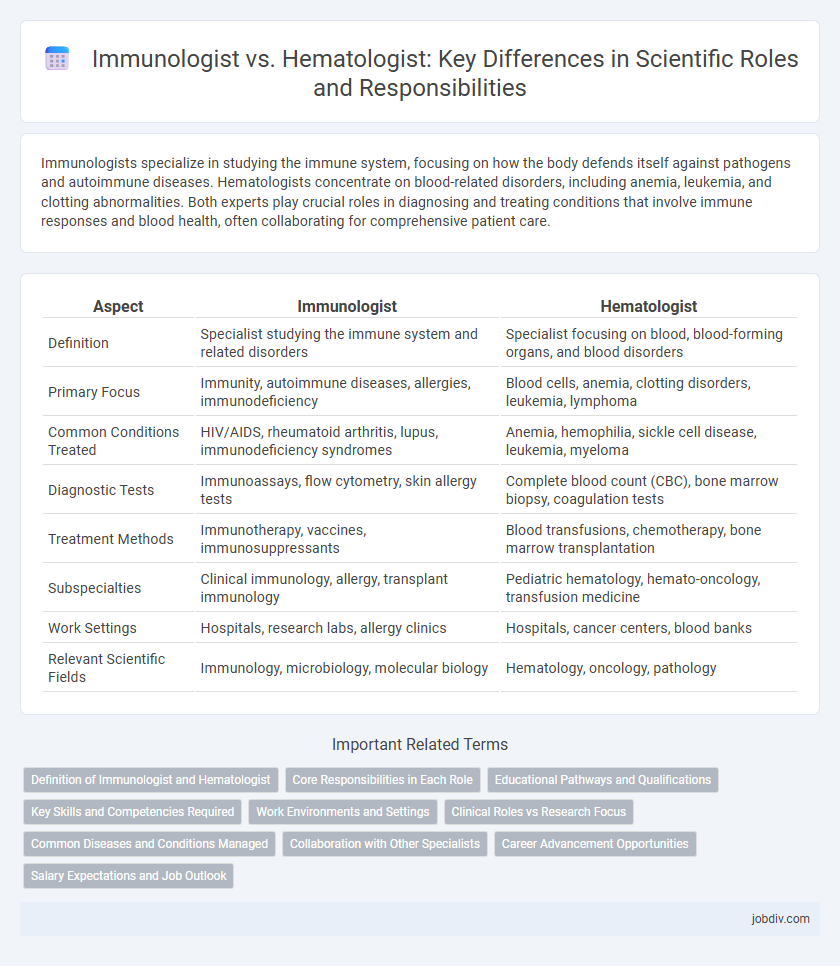Immunologists specialize in studying the immune system, focusing on how the body defends itself against pathogens and autoimmune diseases. Hematologists concentrate on blood-related disorders, including anemia, leukemia, and clotting abnormalities. Both experts play crucial roles in diagnosing and treating conditions that involve immune responses and blood health, often collaborating for comprehensive patient care.
Table of Comparison
| Aspect | Immunologist | Hematologist |
|---|---|---|
| Definition | Specialist studying the immune system and related disorders | Specialist focusing on blood, blood-forming organs, and blood disorders |
| Primary Focus | Immunity, autoimmune diseases, allergies, immunodeficiency | Blood cells, anemia, clotting disorders, leukemia, lymphoma |
| Common Conditions Treated | HIV/AIDS, rheumatoid arthritis, lupus, immunodeficiency syndromes | Anemia, hemophilia, sickle cell disease, leukemia, myeloma |
| Diagnostic Tests | Immunoassays, flow cytometry, skin allergy tests | Complete blood count (CBC), bone marrow biopsy, coagulation tests |
| Treatment Methods | Immunotherapy, vaccines, immunosuppressants | Blood transfusions, chemotherapy, bone marrow transplantation |
| Subspecialties | Clinical immunology, allergy, transplant immunology | Pediatric hematology, hemato-oncology, transfusion medicine |
| Work Settings | Hospitals, research labs, allergy clinics | Hospitals, cancer centers, blood banks |
| Relevant Scientific Fields | Immunology, microbiology, molecular biology | Hematology, oncology, pathology |
Definition of Immunologist and Hematologist
An immunologist is a medical specialist who studies and treats disorders related to the immune system, including allergies, autoimmune diseases, and immunodeficiencies. A hematologist focuses on the diagnosis and treatment of blood disorders such as anemia, leukemia, and clotting abnormalities. Both specialists play critical roles in managing complex systemic conditions involving immune response and blood health.
Core Responsibilities in Each Role
Immunologists specialize in diagnosing and treating immune system disorders, conducting research on immune responses, and developing therapies for autoimmune diseases and allergies. Hematologists focus on diagnosing and managing blood disorders, including anemia, leukemia, and clotting abnormalities, by performing blood tests and bone marrow examinations. Both specialists collaborate in cases involving immune-related blood diseases but maintain distinct core responsibilities centered on immune function and blood pathology, respectively.
Educational Pathways and Qualifications
Immunologists typically complete a medical degree followed by specialized residency training in internal medicine or pediatrics, plus a fellowship in immunology to gain expertise in immune system disorders, autoimmune diseases, and allergies. Hematologists pursue a similar initial path with a medical degree and internal medicine residency, but then specialize through a hematology fellowship focused on blood disorders, including anemia, clotting abnormalities, and hematologic malignancies. Certification by respective boards such as the American Board of Allergy and Immunology for immunologists or the American Board of Internal Medicine for hematologists validates their specialized knowledge and clinical skills.
Key Skills and Competencies Required
Immunologists require expertise in immune system functioning, proficiency in diagnostic assays like flow cytometry, and strong analytical skills to interpret complex immunological data. Hematologists must possess in-depth knowledge of blood disorders, competence in bone marrow biopsies, and skills in laboratory techniques such as complete blood count (CBC) analysis. Both specialties demand critical thinking, research aptitude, and the ability to collaborate in multidisciplinary clinical settings.
Work Environments and Settings
Immunologists primarily conduct research and clinical work in laboratory settings, hospitals, and specialized clinics focusing on diagnosing and treating immune system disorders. Hematologists typically work in hospitals, blood banks, and oncology centers where they manage blood diseases, perform bone marrow biopsies, and oversee transfusion medicine. Both specialists often collaborate in multidisciplinary teams to address complex conditions involving immune and hematologic systems.
Clinical Roles vs Research Focus
Immunologists specialize in diagnosing and treating immune system disorders, focusing clinically on autoimmune diseases, allergies, and immunodeficiencies while their research often explores immune responses and vaccine development. Hematologists concentrate clinically on blood disorders such as anemia, leukemia, and clotting abnormalities, with research aimed at understanding hematopoiesis, blood cancers, and novel therapeutic interventions. Both disciplines overlap in areas like transplant immunology and hematologic malignancies, but immunologists emphasize immune mechanisms whereas hematologists focus on blood pathology and treatment.
Common Diseases and Conditions Managed
Immunologists specialize in diagnosing and treating disorders related to the immune system, such as autoimmune diseases (rheumatoid arthritis, lupus), immunodeficiencies, and allergies. Hematologists focus on blood-related conditions, including anemia, leukemia, lymphoma, and clotting disorders like hemophilia. Both specialists often collaborate on complex cases such as autoimmune hemolytic anemia and bone marrow failure syndromes.
Collaboration with Other Specialists
Immunologists frequently collaborate with hematologists to diagnose and treat disorders involving the immune system and blood, such as autoimmune hemolytic anemia and lymphomas. Their combined expertise enables comprehensive patient care through coordinated diagnostic tests like flow cytometry and bone marrow biopsies. Interdisciplinary teamwork enhances the development of personalized therapies, including immunomodulatory drugs and targeted biologics.
Career Advancement Opportunities
Immunologists often advance by engaging in specialized research or clinical trials targeting immune system disorders, allowing for roles in academic institutions or pharmaceutical companies. Hematologists pursue career growth through expertise in blood diseases and treatments, expanding into transfusion medicine, oncology, or bone marrow transplantation. Both fields offer leadership positions in hospital departments, research labs, and professional organizations, emphasizing continuous education and certification.
Salary Expectations and Job Outlook
Immunologists typically earn an average annual salary ranging from $80,000 to $130,000, influenced by research, clinical practice, and academic roles, while hematologists often command higher salaries between $150,000 and $300,000 due to specialized patient care and procedural expertise. The job outlook for hematologists is robust with steady demand driven by the prevalence of blood disorders and cancer treatments, whereas immunologists experience growing opportunities linked to advancements in vaccine development and autoimmune disease research. Both specialties require extensive medical training, but hematology's clinical focus generally offers higher compensation compared to immunology's research-oriented career paths.
Immunologist vs Hematologist Infographic

 jobdiv.com
jobdiv.com